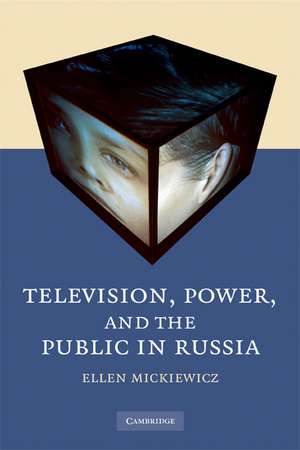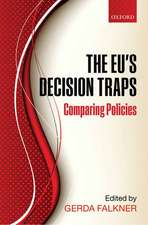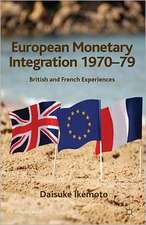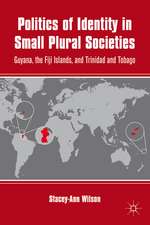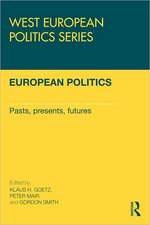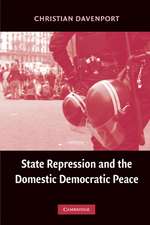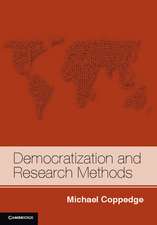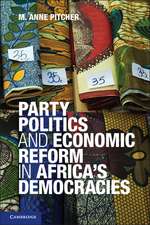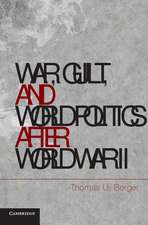Television, Power, and the Public in Russia
Autor Ellen Mickiewiczen Limba Engleză Paperback – 19 mar 2008
| Toate formatele și edițiile | Preț | Express |
|---|---|---|
| Paperback (1) | 284.01 lei 6-8 săpt. | |
| Cambridge University Press – 19 mar 2008 | 284.01 lei 6-8 săpt. | |
| Hardback (1) | 679.94 lei 6-8 săpt. | |
| Cambridge University Press – 19 mar 2008 | 679.94 lei 6-8 săpt. |
Preț: 284.01 lei
Nou
Puncte Express: 426
Preț estimativ în valută:
54.35€ • 56.88$ • 45.23£
54.35€ • 56.88$ • 45.23£
Carte tipărită la comandă
Livrare economică 01-15 aprilie
Preluare comenzi: 021 569.72.76
Specificații
ISBN-13: 9780521716758
ISBN-10: 0521716756
Pagini: 220
Dimensiuni: 152 x 227 x 14 mm
Greutate: 0.36 kg
Editura: Cambridge University Press
Colecția Cambridge University Press
Locul publicării:Cambridge, United Kingdom
ISBN-10: 0521716756
Pagini: 220
Dimensiuni: 152 x 227 x 14 mm
Greutate: 0.36 kg
Editura: Cambridge University Press
Colecția Cambridge University Press
Locul publicării:Cambridge, United Kingdom
Cuprins
1. The missing term in the equation; 2. Detecting channels; 3. Election news and angry viewers; 4. Excavating concealed tradeoffs; 5. Soviet television – Russian memories; 6. Endings; 7. The other side of the screen.
Recenzii
'Television, Power, and the Public in Russia by Ellen Mickiewicz, a highly respected authority on the political role of television in Russia, provides surprising and significant insights into the gap separating the current Russian leadership from the Russian people.' Zbigniew Brzezinski, Counselor and Trustee, Center for Strategic and International Studies
'A fascinating approach to current issues in post-Soviet television. Mickiewicz has an unparalleled range and depth of knowledge and is not afraid to use this to create a more personal approach. This is an important book that makes a significant contribution toward understanding the particular pathologies of the broadcast sphere in Russia through the study of the audience.' Sarah Oates, Department of Politics, University of Glasgow
'This focus group based study of Russian television audiences presents a superb analysis of the many ways in which diverse life circumstances alter television's impact on viewers. It also provides fascinating insights into ordinary citizens' perceptions of life, politics, and the mass media in contemporary Russia, using U.S. news media and politics as a foil for comparison. This is essential reading for comparativists, political psychologists, and mass media scholars.' Doris Graber, Department of Political Science, University of Illinois at Chicago
'… Ellen Mickiewicz, Professor of Political Science at Duke University, yesterday was one of the most highly regarded American Sovietologists; now [she is] the greatest authority in the field of the study and analysis of Russian mass media. … Liberty, even when it is limited always has a revolutionary potential. More so if the power ignores the impact, as emerges from the fine research of the American political scientist.' Piero Ostellino, editor-in-chief of Corriere
'Television, Power and the Public in Russia is an impressive and original study of TV viewers in post-Soviet Russia. … Mickiewicz has written an excellent book … This study makes a significant contribution to our knowledge about the relation between TV watchers, political leadership, and the peculiarities of television in Russia. It also contributes to studies of comparative politics, society and applied heuristics.' The Review of Politics
'Mickiewicz handles her subject with the deftness of a surgeon and the broad knowledge and seasoned understanding of an archaeologist working in the multidisciplinary field of mass media studies. Her work is seminal and as such the starting point for any future research on the Russian television audience, which may well inform us on the future of that country more than any of the research that focuses on the workings of the not-so-new political system.' Peter Gross, Political Communication
'A fascinating approach to current issues in post-Soviet television. Mickiewicz has an unparalleled range and depth of knowledge and is not afraid to use this to create a more personal approach. This is an important book that makes a significant contribution toward understanding the particular pathologies of the broadcast sphere in Russia through the study of the audience.' Sarah Oates, Department of Politics, University of Glasgow
'This focus group based study of Russian television audiences presents a superb analysis of the many ways in which diverse life circumstances alter television's impact on viewers. It also provides fascinating insights into ordinary citizens' perceptions of life, politics, and the mass media in contemporary Russia, using U.S. news media and politics as a foil for comparison. This is essential reading for comparativists, political psychologists, and mass media scholars.' Doris Graber, Department of Political Science, University of Illinois at Chicago
'… Ellen Mickiewicz, Professor of Political Science at Duke University, yesterday was one of the most highly regarded American Sovietologists; now [she is] the greatest authority in the field of the study and analysis of Russian mass media. … Liberty, even when it is limited always has a revolutionary potential. More so if the power ignores the impact, as emerges from the fine research of the American political scientist.' Piero Ostellino, editor-in-chief of Corriere
'Television, Power and the Public in Russia is an impressive and original study of TV viewers in post-Soviet Russia. … Mickiewicz has written an excellent book … This study makes a significant contribution to our knowledge about the relation between TV watchers, political leadership, and the peculiarities of television in Russia. It also contributes to studies of comparative politics, society and applied heuristics.' The Review of Politics
'Mickiewicz handles her subject with the deftness of a surgeon and the broad knowledge and seasoned understanding of an archaeologist working in the multidisciplinary field of mass media studies. Her work is seminal and as such the starting point for any future research on the Russian television audience, which may well inform us on the future of that country more than any of the research that focuses on the workings of the not-so-new political system.' Peter Gross, Political Communication
Notă biografică
Descriere
Describes the control of Russian television by government, and the reaction of ordinary citizens.
